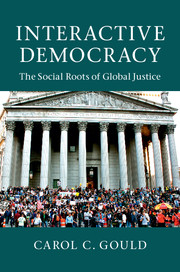Book contents
- Frontmatter
- Dedication
- Contents
- Acknowledgements
- Introduction
- Part I A theoretical framework
- Part II The social roots of global justice
- 5 Transnational solidarities
- 6 Does global justice presuppose global solidarity?
- 7 Recognition and care in global justice
- 8 Gender equality, culture, and the interpretation of human rights
- 9 The sociality of free speech: the case of humor across cultures
- 10 Violence, power-with, and the human right to democracy
- Part III Interactive democracy – transnational, regional, global
- Works cited
- Index
- References
5 - Transnational solidarities
Published online by Cambridge University Press: 05 September 2014
- Frontmatter
- Dedication
- Contents
- Acknowledgements
- Introduction
- Part I A theoretical framework
- Part II The social roots of global justice
- 5 Transnational solidarities
- 6 Does global justice presuppose global solidarity?
- 7 Recognition and care in global justice
- 8 Gender equality, culture, and the interpretation of human rights
- 9 The sociality of free speech: the case of humor across cultures
- 10 Violence, power-with, and the human right to democracy
- Part III Interactive democracy – transnational, regional, global
- Works cited
- Index
- References
Summary
Introduction
It should be clear from the foregoing chapters that the fulfillment of global justice and human rights, as well as increases in democracy, cannot be accomplished through political changes alone, or by means of individual acts of humanitarianism or charity. In this part of the book, I want to investigate some of the key social roots of global justice and related norms, and to consider the social dispositions and transformations that their fulfillment requires. In this investigation, the notion of solidarity and the related concept of mutual aid loom large. Later in this part, I take up care and recognition, gender equality in diverse cultures and the issue of interpreting human rights, expression in cross-cultural perspective, and new cooperative notions of power that may help to deal with contemporary violence and the problems it poses for extending democracy and justice transnationally.
This chapter attempts to re-envision solidarity from its primary historical meaning as a relationship binding all the members of a single cohesive group or society toward a conception more suitable for the new forms of transnational interrelationships that mark contemporary globalization. It considers the supportive relations we can come to develop with people at a distance, given the interconnections that are being established through work or other economic ties, through participation in Internet forums and especially through social media, or indirectly through environmental impacts. Solidarity relations are reconceptualized here as potentially contributing to the emergence of more democratic forms of transnational interaction within regional or more fully global frameworks of human rights, for which I have argued earlier in this book and in previous work. Beyond this, I propose that affective relations of solidarity are an essential complement to the recognition of these human rights themselves. This new notion of solidarity is understood here as one of overlapping solidarity networks. It will be seen that this conception also engages the idea of justice, and indeed of global justice, in an important way.
- Type
- Chapter
- Information
- Interactive DemocracyThe Social Roots of Global Justice, pp. 99 - 118Publisher: Cambridge University PressPrint publication year: 2014

